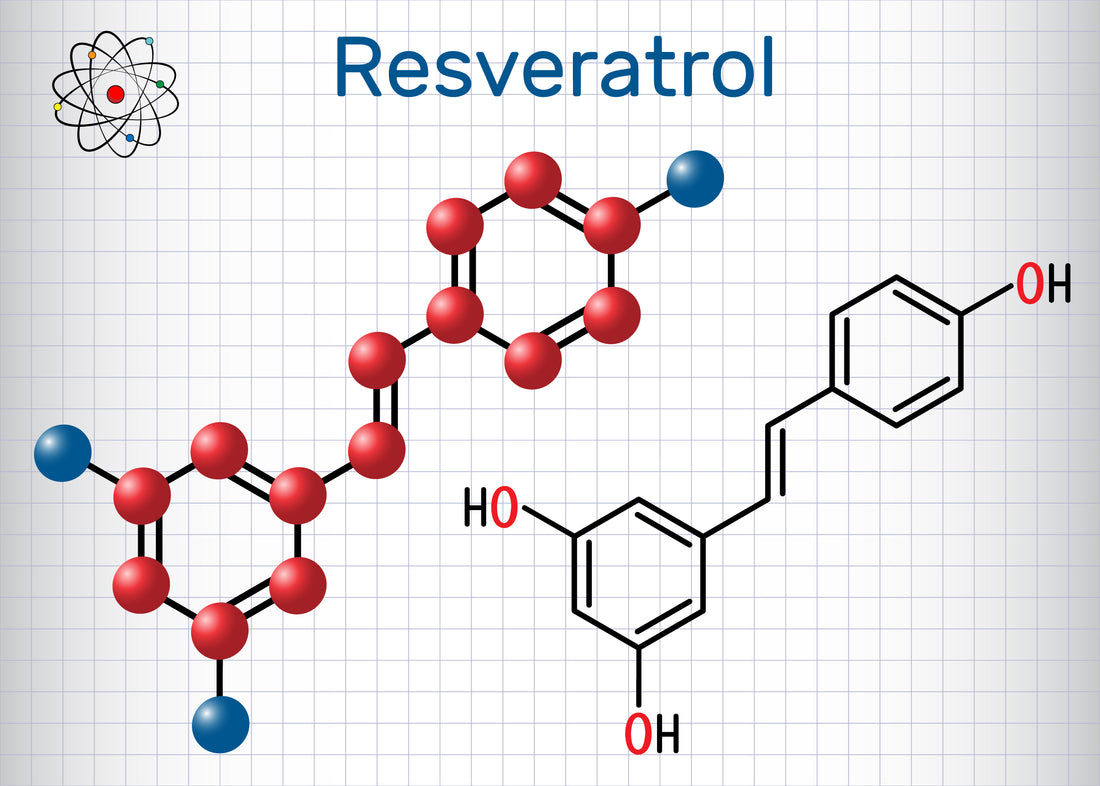Because so many of you have asked, I wanted to take a deep dive into resveratrol, a naturally occurring chemical with numerous benefits. This article will touch on some of the science-based research that proves exactly why we believe everyone should be using resveratrol as part of their skincare regimen. If you don’t necessarily want to learn those details, it’s perfectly fine to skip down to the last section, where I summarize the benefits for you.
Until 20 years ago, not many people outside of the medical field had ever heard of the chemical resveratrol. It’s a naturally occurring chemical compound found in grape skins, various berries, seeds, and nuts. This was about the time that medical researchers began discovering that people who consumed higher amounts of resveratrol in their diets had improved heart health, stronger immune systems, and even longer lifespans. Within a few years, doctors and nutritionists were recommending high-resveratrol foods and supplements to their patients as an essential part of a healthy diet.
As resveratrol became increasingly popular, another benefit began to emerge: healthier skin. Dermatological researchers found that in addition to the internal medical benefits, a resveratrol serum can also improve skin elasticity, enhance firmness, and reverse lines and wrinkles. To some, this may sound too good to be true. But before you dismiss resveratrol as just another cosmetology fad that overpromises and underdelivers, you owe it to yourself to review the research. As it turns out, the science stands firmly behind the claims, and I concur.
What Researchers Have Discovered About Resveratrol and Skincare
A 2014 study conducted by Tulane University Department of Dermatology determined that “resveratrol is an effective anti-aging molecule with diverse biologic activity.” The participants applied resveratrol lotion to their faces on a daily basis over 12 weeks. In addition to noting a marked improvement when in skin firmness, elasticity, laxity, and radiance, the average increase in dermal thickness (measured by ultrasound) was an impressive 18.9%!
An earlier 2012 study submitted to the National Center for Biotechnology Information involving 50 male and female participants demonstrated similar improvements among the test group after 60 days. The researchers noted improved moisturization and elasticity and a reduction in skin roughness and wrinkles. Additionally, “values for systemic oxidative stress, plasmatic antioxidant capacity, and skin antioxidant power had increased significantly.”
Additional research has demonstrated that resveratrol promotes UV protection, but you will still definitely want to use sunscreen.
These are just a few of the scientific, peer-reviewed studies that I found surrounding this exciting discovery.
Understanding Resveratrol: A Skin-Boosting Powerhouse
But how can one chemical found in a handful of common fruits and nuts deliver so many benefits to our skin? In this section, I will explain some of the ways that resveratrol achieves these incredible results.
Fighting Free Radicals
Ultraviolet rays, airborne pollutants, and toxins like cigarette smoke create unstable atoms in your skin due to unpaired electrons. These unpaired electrons try to match with electrons in other atoms, which causes oxidative stress to occur. Antioxidants, like those found in resveratrol, donate spare electrons to the unstable atoms, reducing the occurrence of free radicals. In short, oxidative stress is a significant factor in aging, and resveratrol alleviates the condition.
Increased Collagen Production
Type III collagen is a fibrous protein that, among other things, promotes elasticity and strengthens the skin. As we age, collagen production slows down, which is one of the reasons that older skin appears to be thinner and more wrinkled than younger skin.
Resveratrol stimulates fibroblasts, which are the skin cells that produce collagen. Additionally, resveratrol eliminates free radicals, which damage collagen fibers. Some researchers also believe that resveratrol increases the genetic activity responsible for the production of collagen. In short, resveratrol increases collagen levels in the skin.
Reducing Brown Spots
Tyrosinase is a naturally produced chemical enzyme that provides color in the skin. Overproduction of the enzyme tyrosinase results in spotty hyperpigmentation. Resveratrol counters the production of tyrosinase and helps skin maintain a more even tone. In the studies referenced above, researchers noted a reduction in age spots among the participants.
Reducing Inflammation
Resveratrol also suppresses the production of cyclooxygenase enzymes, which promote the prostaglandins that are partially responsible for inflammation. Additionally, by alleviating oxidative stress, it allows the body to increase the body’s ability to reduce inflammation, which is a net positive for your skin.
Resveratrol’s Role in Skin Rejuvenation
As you can see from the previous section, resveratrol benefits for the skin are numerous, which is why so many dermatologists and skincare experts (including myself) have begun recommending topical resveratrol applications to our patients and clients. While resveratrol doesn’t replace other essential skincare practices, like using sunscreen, moisturizing, drinking water, etc., it is an integral factor in skin rejuvenation — maybe one of the most important factors.
Consider the fact that many skincare products are designed to maintain or slow the aging process — or at least, many products claim that. An SPF-rated sunscreen, for example, is essential to protect your skin from the harmful effects of the sun, which can slow the aging process in the long run, but it does little to restore the youthful glow of your skin if it’s already been damaged.
Resveratrol is not a replacement for sunscreen but in addition to improving your skin’s healthful tone and appearance, it helps to reverse skin damage, reduce wrinkles, fade age spots, and more. With this in mind, resveratrol should be incorporated into your skincare regimen but it should not replace these other essential steps.
Resveratrol’s Impact on Skin Elasticity
If you aren’t certain what skin elasticity is, it’s simply the ability of the skin to be stretched and bounce back. Younger skin has high elasticity, while older skin tends to regain its shape more slowly.
One of the more fantastic discoveries that have resulted from the explosion of resveratrol use is the way that it improves skin elasticity. This has been documented in multiple studies, but the anecdotal evidence from resveratrol users — many of whom use Serious Skincare® products is almost equally compelling. Here’s how resveratrol accomplishes this miraculous outcome:
Collagen Production
Resveratrol stimulates fibroblasts and protects them from damaging factors. These fibroblasts are largely responsible for collagen production in the skin, which has the effect of making skin firmer and more elastic. Resveratrol also limits collagen breakdown, which means your body doesn’t have to produce excess collagen for it to keep your skin healthy and young.
Antioxidants
Free radicals destroy collagen by disrupting its molecular integrity. Because resveratrol helps to eliminate free radicals, it protects the collagen (in addition to increasing collagen production). This property also helps to mitigate damage from ultraviolet rays, giving your skin an extra layer of protection beneath your sunscreen.
Reducing MMPs
Many members of the medical community believe that resveratrol may reduce the production of matrix metalloproteinases (MMPs) — enzymes that destroy elastin and existing collagen. While the research in this area is not conclusive, it does indicate that this is probably the case.
Antiinflammatory Properties
As is the case with many undesirable conditions in the human body, inflammation is partially triggered by the release of cyclooxygenase (COX) enzymes. Inflammation in the skin can reduce elasticity by decreasing the effectiveness of elastin and collagen.
In other words, even if you have sufficient supplies of these skin-tightening materials, inflamed skin makes it more difficult for them to maintain your skin’s resilience. Resveratrol counters the production of COX-1 and COX-2 enzymes, as well as inflammation-inducing cytokines, which help reduce inflammation and keep the skin’s texture snappy and tight.
Resveratrol’s Impact on Skin Aging
As we grow older, our skin develops signs of aging, such as wrinkles, fine lines, and a general looseness as the skin loses elasticity. It can also change color in certain areas as hyperpigmentation causes age spots.
While you might believe that your skin is as old as you are, it’s important to remember that your body sheds and replaces skin cells continuously. With its many beneficial properties, resveratrol can give you the appearance that your aging process is reversing. To summarize how resveratrol can help you achieve younger, fresher skin that belies your age:
- Increasing collagen production to tighten the skin and reduce lines and wrinkles.
- Producing antioxidants that mitigate free radicals.
- Blocking the production of enzymes (MMPs) that contribute to the breakdown of elastin and collagen.
- Reducing the production of tyrosinase, which causes hyperpigmentation and age spots.
- Increasing your skin’s resistance to the sun and UV rays.
Researchers are still making new discoveries about resveratrol and how it makes skin younger looking and healthier. In the meantime, there’s a scientific consensus that resveratrol should be incorporated into every adult's skincare regimen.
Including Resveratrol in Your Skincare Routine: Tips and Tricks
While it’s possible to improve resveratrol levels through diet, it’s difficult to eat enough of the right kinds of foods to make an impact. For skincare, it’s far better to apply resveratrol topically, where it can be absorbed through the skin. Resveratrol can be found in many skincare products, but it’s important to understand that they are not all the same.
You should consider the following criteria when exploring resveratrol options:
- Concentration – The greater the resveratrol concentration, the less you will need to use to get the same effects. Consider the Serious Skincare® Resveratrol Drench X5 Concentrate. It contains five times the amount of metabiotic resveratrol found in most commercial skin treatments.
- Skin Sensitivity and Allergies – You may not be allergic to resveratrol, but many manufacturers put fragrances or chemicals in their products that can trigger skin allergies. If you have sensitive skin, start with a product that’s been tested and approved for sensitive skin, like the Serious Skincare® Absolutes Age Disruptor.
- Confirmed Results – Serious Skincare tests their products with sample groups and then posts the findings next to the product on their respective webpages. For example,
- For example, 30 participants used our Eyetality Evening Eye Cream for four weeks. 93% said the skin under their eyes looked tighter, and 80% of participants reported that Eyetality Evening improved every visible age-related issue of the eye area, including a reduction in dark circles.

The resveratrol benefits for the skin have been well established, and Serious Skincare® has proven the effectiveness of our products time and again. If you want to love your skin, shop resveratrol Serious Skincare® products today.


